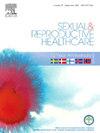行动障碍人士孕前教育干预的初步研究
IF 1.7
3区 医学
Q3 PUBLIC, ENVIRONMENTAL & OCCUPATIONAL HEALTH
引用次数: 0
摘要
目的评估我们为行动障碍人士量身定制的孕前教育干预的可行性和可接受性。方法采用前瞻性的孕前试验研究,对未来5年内可能怀孕的行动障碍患者实施教育干预的可行性和可接受性进行评估。使用配对t检验比较前后的一般健康和孕前知识。26名参与者在2023年11月至2024年7月期间完成了研究。与行动障碍相关的最常见诊断为脊髓损伤(n = 9)、脊柱裂(n = 4)和脑瘫(n = 4)。干预使一般健康知识提高了0.9分(p = 0.13),使孕前健康知识提高了2.7分(p = 0.025)。显著增加(1.8个点(95% CI 0.9-2.6个点),p <;与一般健康知识相比,孕前健康知识的差异为0.001),表明干预成功改善了目标知识领域。结论本初步研究证明了针对行动障碍个体的孕前教育干预的可行性和可接受性。这一干预措施有可能提高健康素养,增加孕前健康知识,并最终改善行动不便人群的妊娠结局。本文章由计算机程序翻译,如有差异,请以英文原文为准。
Pilot study for a preconception educational intervention for people with mobility disabilities
Objectives
To assess the feasibility and acceptability of our newly designed, tailored preconception educational intervention for people with mobility disabilities.
Methods
A prospective pre-post pilot study to measure the feasibility and acceptability of an educational intervention for people with mobility disabilities who could become pregnant in the next five years. Before and after general health and preconception knowledge were compared using paired t-tests.
Results
26 participants completed the study from November 2023 − July 2024. The most common diagnoses related to mobility disability were spinal cord injury (n = 9), spina bifida (n = 4), and cerebral palsy (n = 4). The intervention increased general health knowledge by 0.9 points (p = 0.13) and preconception health knowledge by 2.7 points (p = 0.025). A significant increase (1.8 points (95 % CI 0.9–2.6 points), p < 0.001) in preconception health knowledge compared to general health knowledge suggests the intervention successfully improved the targeted knowledge area.
Conclusions
This pilot study demonstrated the feasibility and acceptability of a preconception educational intervention tailored to individuals with mobility disabilities. This intervention holds the potential to improve health literacy, increase preconception health knowledge, and ultimately improve pregnancy outcomes among people with mobility disabilities.
求助全文
通过发布文献求助,成功后即可免费获取论文全文。
去求助
来源期刊

Sexual & Reproductive Healthcare
PUBLIC, ENVIRONMENTAL & OCCUPATIONAL HEALTH-
CiteScore
2.70
自引率
5.60%
发文量
73
审稿时长
45 days
 求助内容:
求助内容: 应助结果提醒方式:
应助结果提醒方式:


